You found our list of top mentoring books.
Mentoring books are guides that explain how to perform career coaching. These guides cover topics such as finding and establishing a relationship with a mentor, challenging and engaging mentees, and building mentorship programs within organizations. The purpose of these books is to help both parties get the most benefits out of the relationship.
These guides are a type of employee engagement book and are similar to training and development books, coaching books, and books on leadership. These books usually include mentorship program ideas.
This list includes:
- mentoring program books
- business mentoring books
- mentoring books for the workplace
Here we go!
List of mentoring books
Here is a list of books on mentoring that improve mentoring skills, build better programs, and help emerging professionals get the development they need to excel.
1. Mentoring 101: What Every Leader Needs to Know by John C Maxwell
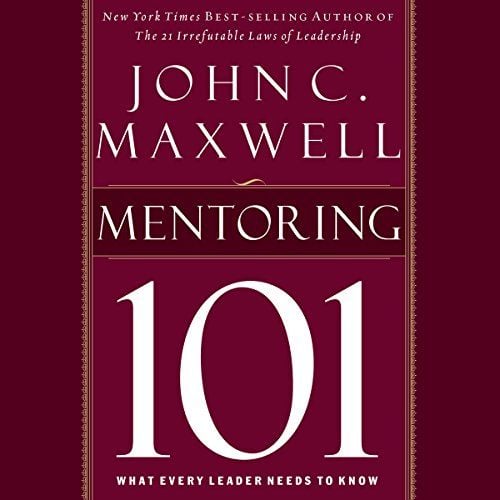
Mentoring 101 is one of the best business mentoring books. This guide covers the ins-and-outs of effective mentoring, from how to prepare and adopt the right mindset to be a mentor, to engaging mentees, to pushing people to reach their full potential. The book explains how to find fit when matching mentees, how to create an environment where protégés can thrive, and how to evaluate growth. Mentoring 101 gives a basic overview of the best practices of mentorship and puts out the call for good leaders to become mentors. The book shows how the act can empower employees to become their best selves, and provides a roadmap for bringing out the best in emerging professionals.
Notable Quote: “You have to look at the person’s gifts, temperament, passions, successes, joys, and opportunities. And once you find that seed, you need to fertilize it with encouragement and water it with opportunity. If you do, the person will blossom before your eyes.”
Read Mentoring 101, and check out more of John C Maxwell’s work on this list of teamwork books.
2. One Minute Mentoring: How to Find and Work With a Mentor–And Why You’ll Benefit from Being One by Ken Blanchard and Claire Diaz-Ortiz
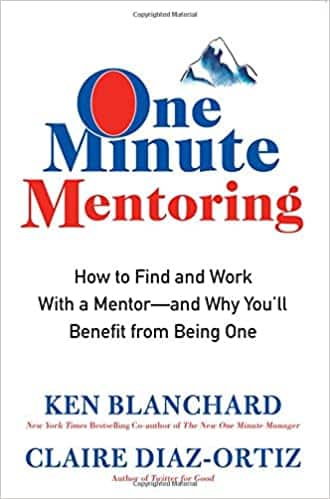
One Minute Mentoring is one of the more helpful mentoring books for the workplace. This guide approaches the mentoring process from both the mentor and mentee perspectives. Early chapters present step-by-step instructions for finding a mentor, setting up initial meetings, and setting goals for the relationship. The book speaks to topics such as building trust, networking, and engaging each other. The end of the book outlines how to become a mentor, launch a mentorship program within an organization, and distinguish between coaching and mentoring. The book is anchored by an ongoing narrative where a central fictional character progresses through a mentorship relationship, a story that serves as an example of these ideas in action. One Minute Mentoring presents a quick crash course in mentoring to participants on both sides of the equation.
Notable Quote: “Setting an intention to get help is an important first step in the mentoring process.”
Read One Minute Mentoring, and check out more of Ken Blanchard’s work on this list of team building books.
3. The Mentor Leader: Secrets to Building People and Teams That Win Consistently by Tony Dungy and Nathan Whitaker
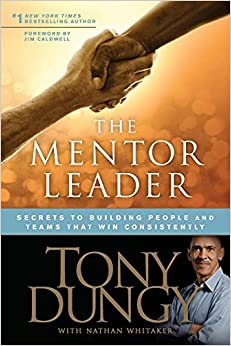
Author Tony Dungy is a champion NFL coach who shares his secrets and insights on bringing out the best in a team. The Mentor Leader is a call to action to adopt a servant leader attitude that puts mentorship at the center of every decision. The guide lays out a set of principles for this style of leadership, such as shifting the focus from yourself to others, setting a positive example, and building meaningful relationships. The book includes tools and tips such as “the seven E’s of enhancing potential,” and the characteristics of a good mentor leader. Dungy shows readers how to fulfill the responsibilities of drawing out talent and guiding wins. The Mentor Leader is a playbook for having a positive influence and impact on those you are in charge of.
Notable Quote: “Engage, educate, equip, encourage, empower, energize, and elevate. Those are the methods for maximizing the potential of any individual, team, organization, or institution for ultimate success and significance. Those are the methods of a mentor leader.”
Read The Mentor Leader.
4. The Mentor’s Guide: Facilitating Effective Learning Relationships by Lois J. Zachary
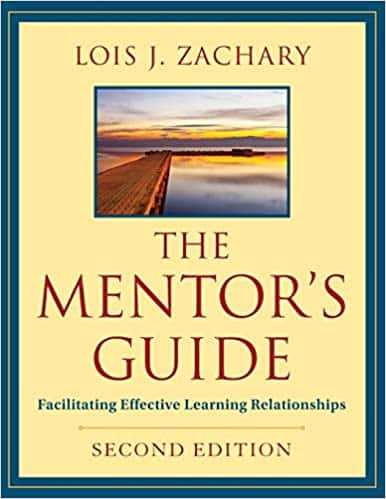
The Mentor’s Guide is one of the best books on mentoring. Lois J Zachary is a thought leader in the mentoring world. This guide serves as a valuable resource for developing productive relationships. The book covers the different phases of mentorship and explores how the partnership can evolve as the process progresses. The text shows both parties how to agree on objectives and expectations, support and challenge each other, give and receive feedback, and form new goals as the journey unfolds. This guide emphasizes that mentorship is a two-way process and a team learning exercise, and shows how both parties can benefit from the partnership.
Notable Quote: “Today mentoring has become collaborative; it is now a mutual discovery process in which both the mentor and mentee have something to bring to the relationship (“the give”) and something to gain that broadens each of their perspectives (“the get). Wisdom is not passed down but discovered and nurtured, This shift frees both partners to learn together.”
Read The Mentor’s Guide.
5. The Mentoring Manual: Your Step by Step Guide to Being a Better Mentor by Julie Starr
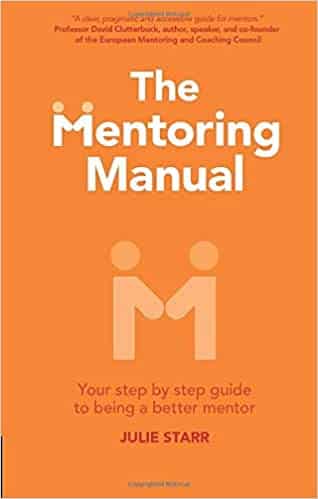
The Mentoring Manual provides simple instructions for being a good mentor. The book opens by defining and clarifying the mentor relationship, then moves on to share principles and best practices, traits of good mentors, and common pitfalls in the process. Julie Starr gives concrete advice on how to give mentees confidence and support, guide their growth, and overcome the barriers that can slow or halt progress. The book is in an easily-scannable, textbook-like format, with tools like reflection questions, checklists, exercises, and tips and hints breaking up the text.
Notable Quote: “Where the organization has a specific agenda for the mentoring that is not something both the mentor and the mentee are engaged in, this can dilute the integrity of the mentor role.”
Read The Mentoring Manual.
6. Bridging Differences for Better Mentoring by Lisa Z. Fain and Lois J. Zachary
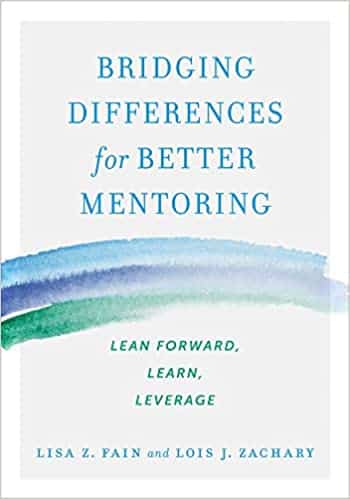
Bridging Differences for Better Mentoring is a guide to mentoring individuals who have vastly different backgrounds, identities, and perspectives. For example, intergenerational mentees, or mentees from different cultures or races. The guide shows how to be sensitive to and respect those differences while still challenging mentees. The authors show mentors how to establish common ground, build a rapport, and facilitate growth in these diverse mentoring relationships. The book shows mentors how to understand and empathize with their mentees, and help mentees become the best version of themselves rather than forcing mentees into a mold. Chapters tackle topics such as acknowledging bias and privilege, getting to know each other, and delivering feedback constructively. Bridging Differences for Better Mentoring is an especially important book in an age where workforces are growing ever more diverse, and knowledge
Notable Quote: “It is the mentor’s responsibility to create a safe and trusting space that enables a mentee to stretch and step outside their comfort zone, take risks, and show up authentically.”
Read Bridging Differences for Better Mentoring, and check out these books on diversity and inclusion.
7. 10 Steps to Successful Mentoring by Wendy Axelrod
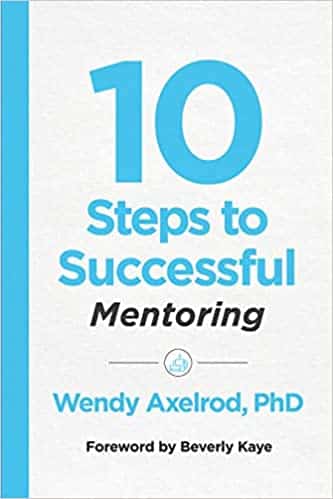
10 Steps to Successful Mentoring is a guide to becoming a better mentor. This work consists of a series of tools intended to help develop mentoring skills. For example, mentorship readiness checklists, topics to discuss during meetings, sample agendas, guidelines for assignments, and questions to ask mentees during a variety of circumstances. The book outlines mentorship etiquette and shows mentors how to design meaningful meetings and gauge mentees’ growth throughout the program. 10 Steps to Successful Mentoring is the ultimate handbook for professionals taking on protégés and looking to make a difference in a less experienced colleague’s career.
Notable Quote: “The most seasoned and successful mentors know it is not their expertise and years of problem solving that create the basis for their best work as a mentor. It is much more about how they engage their mentee, requiring mentors to learn and apply specific growth-promoting approaches.”
Read 10 Steps to Successful Mentoring.
8. Mentoring Programs That Work by Jennifer Labin
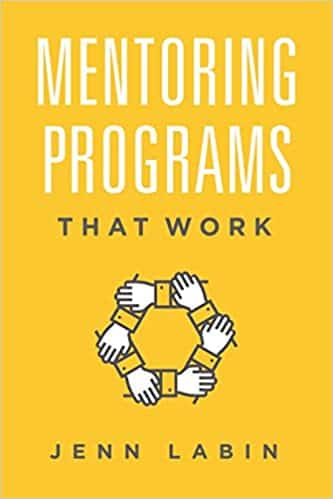
Mentoring Programs that Work is one of the more helpful mentoring program books. The guide provides a planning framework for developing mentorship programs that withstand the test of time and get results. Seasoned program designer Jennifer Labin takes readers through every phase of organizing and implementing a mentoring program, from design, to launch, to measuring results. The book identifies the characteristics of effective programs, and gives leaders tips on creating experiences that serve participating parties. The appendix includes tools such as example program charters, agenda templates, and evaluation assessments. Mentoring Programs that Work presents a systematic approach to mentorship and provides a how-to for organizations looking to nurture future leaders.
Notable Quote: “Because mentors can address whatever the learning needs in the moment, without having to focus on predetermined content, learners can enhance their skills and knowledge in a variety of areas and have the flexibility to explore topics with the greatest urgency and importance.”
Read Mentoring Programs That Work.
9. Elements Of Mentoring: 75 Practices Of Master Mentors by W. Brad Johnson
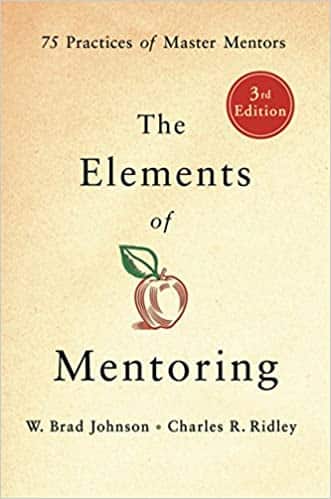
Elements Of Mentoring is a handy pocket guide to being a good mentor. The book is full of tips and affirmations such as “provide correction– even when painful,” “stimulate growth with challenging assignments,” and “promote excellence (but reject perfectionism.)” Sections are short and briefly explain the logic behind the advice, and each chapter ends with a bulleted list of key points. The book covers the full range of responsibilities and situations mentors face, and shows how to be the best guide possible to charges. Elements Of Mentoring is a rulebook for mentors that can be referenced at a glance, and can serve as a handy reminder of good mentoring practices.
Notable Quote: “Choosing mentees is similar to investing. You have limited resources, and you hope for good returns.”
Read Elements Of Mentoring.
10. HBR Guide to Getting the Mentoring You Need (HBR Guide Series) by Harvard Business Review
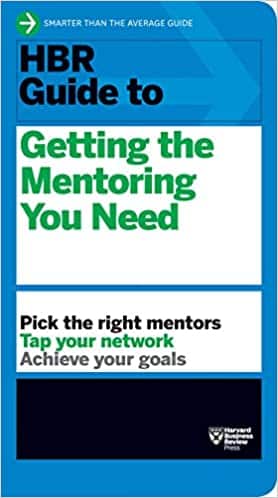
HBR Guide to Getting the Mentoring You Need is a how-to for finding mentors and getting maximum value from the experience. This anthology selects essays from the Harvard Business Review that teach up-and-coming professionals how to own their own professional development. The guide covers how to gain visibility within an organization, set attainable goals, solicit the feedback needed to grow, and develop relationships with influential individuals. The book challenges traditional ideas of what a mentor should look like and encourages readers to build a network of mentors, as well as to give back and reciprocate in the relationship. HBR Guide to Getting the Mentoring You Need goes beyond the basics and shows ambitious individuals how to fine-tune mentorship programs to fast-track success.
Notable Quote: “Mentoring is indispensable to learning throughout our careers, not just while we’re wet behind the ears. It’s how we identify and fill critical gaps we’d struggle to address on our own.”
Read HBR Guide to Getting the Mentoring You Need.
Final Thoughts
Being a mentor is a great responsibility that can have a significant impact on a young professional’s career, and can benefit both parties. Good mentors take this duty seriously and put effort into the process so that the mentee gets the maximum amount of value from the experience.
Mentoring is much more than giving occasional advice, and books can help mentors structure the process so that both parties get great results in exchange for the investment of their time and hard work. These books can also help mentees navigate the process of choosing a mentor and controlling their own personal development, which can be especially useful when strong mentorship programs do not already exist within organizations.
For more advice, check out this list of career books and this list of tips for first time managers.
We also have a list of coaching styles to learn from.
